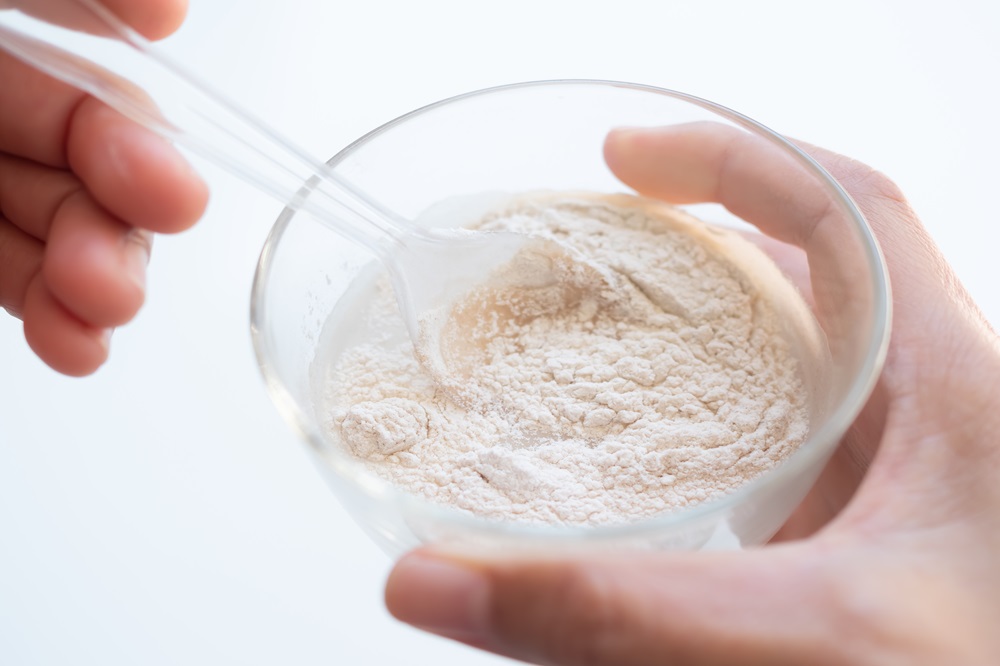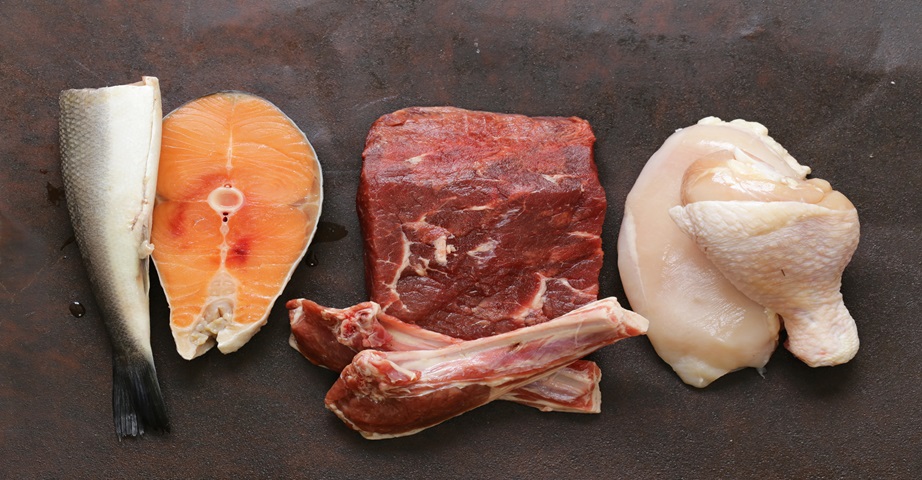Natural collagen in food - what is the most of it?

Collagen is a unique protein found in the human body. It is found mainly in the skin, bones, muscles and tendons. Its production decreases with age, therefore many people reach for collagen supplements. This valuable compound is also found in food: bone broths, meat jellies, fish. What is the most collagen in? How often consume products rich in collagen to maintain a constant level of this component in the body? Is gelatin collagen? In the article we discuss the most important issues related to this topic.
Summary
Natural sources of collagen – where can you find them?
Collagen is one of the most important and complex polymers. It is present in all tissues (cartilage, tendons, skin, bones, teeth, blood vessel walls) and accounts for about 33% of the proteins of the human body. The main amino acids that build the collagen are glycine, proline and hydroxyproline.
The basic function of this structural protein is to connect cells together, which is why it is a building block of most organs. In addition, the collagen:
- provides tissues with adequate mechanical strength,
- supports protective processes within the cartilage tissue,
- participates in the process of blood clotting,
- helps to maintain the proper level of skin hydration, which affects its proper elasticity, appearance and condition,
- facilitates the absorption of minerals, which increases bone density.
With the passage of time and the progressive aging process, the amount of the collagen in the body decreases. Disturbances in the synthesis of this protein begin after the age of 26. They can also be caused by factors such as stress, free radicals, intense solar radiation, smoking and a diet rich in sugar.
Natural collagen in food is found primarily in animal products: jellies, headcheese, pork knuckles, decoctions of bones and skin. Large amounts of this protein are also found in the fish bones, fish scales and tendons of marine fish (cod, tuna, shark). However, products that are natural sources of the collagen contain significant amounts of fat and saturated fatty acids. For this reason, their excess in the diet can contribute to an increase in cholesterol levels in the blood, as a result, increasing the risk of developing cardiovascular diseases.
Is gelatin collagen?
People who want to supplement the collagen in their diet often face the dilemma of whether gelatin is collagen. This popular ingredient in desserts, broths, soups, and sauces is made from collagen derived from bones, skin, and animal tendons.
How much collagen is in gelatin? It is estimated that the content of this compound in this raw material of animal origin can be up to 90%. However, it should be noted that gelatin is characterized by much lower bioavailability than hydrolyzed collagen used in dietary supplements. Moreover, gelatin contains mainly type I collagen, which mainly helps to maintain healthy skin, hair and nails. In collagen supplements, in addition to type I collagen, there is often type II collagen, which supports joint health and tissue regeneration.
Recommended dietary supplements with collagen
What products have the most collagen?
Regular use of the collagen can have a comprehensive effect on the human body. This ingredient can be supplied to the body both in the form of dietary supplements and with everyday food. What products contain the most collagen? What to eat to support the natural production of collagen in the body?
Products rich in natural collagen include:
- jellies,
- pork knuckles,
- bone broth,
- headcheese,
- offal,
- eggs,
- decoction of chicken feet.
When deciding to supplement collagen in the diet, it is also worth knowing what meat has the most collagen. As it turns out, the largest amounts of this protein contain beef. Natural sources of collagen include, among others, beef tendons and ribs, as well as pork loin and bacon.
Collagen in vegetables and fruits - where to look for it?
People who want to support the natural synthesis of collagen often wonder whether this compound can be delivered to the body along with products of plant origin. In which fruits and vegetables is collagen?
Unfortunately, plant foods do not contain collagen protein. Collagen is only found in animal products. However, this does not mean that food obtained from plants has no effect on collagen production. Vitamins and minerals found in vegetables and fruits can positively affect the synthesis and absorption of this compound in the human body.

Is it worth supplementing collagen?
To support the natural production of collagen, it is worth including products rich in this compound in your daily diet. The menu should also include foods rich in amino acids, especially glycine, proline and hydroxyproline, from which collagen protein is formed. For the synthesis of the collagen to proceed properly, the body must also not lack nutrients such as vitamin C, vitamin A, vitamin E, copper and zinc, which support the production of this substance.
Unfortunately, the daily diet often does not provide the right amount of the collagen. In this situation, you can consider using collagen supplements, which are available in the form of tablets, capsules and powder for dissolving in water.
Among the supplements offered by OstroVit you will find the following products with the collagen:
- fish collagen - this type of preparations most often contain type I and II collagen, which is characterized by high bioavailability and easy absorption; hydrolysed form of fish collagen is also characterized by great solubility,
- bovine collagen - is an animal protein derived from cows, which provides the body mainly collagen types I and III; it is perfect for hypersensitivity to fish collagen,
- collagen with vitamin C - is a comprehensive dietary supplement that, in addition to collagen peptides, contains vitamin C, which supports the proper production of collagen,
- collagen with vitamin C and hyaluronic acid - is a preparation in which the recipe, apart from vitamin C and collagen protein, contains hyaluronic acid - a polysaccharide from the group of glycosaminoglycans, which can promote the synthesis of a compound that is an important component of connective tissue.
Collagen supplementation can help increase bone and muscle mass density, reduce pain symptoms associated with osteoarthritis, and maintain normal skin elasticity. It is important that when taking preparations rich in this protein, adhere to the manufacturer's guidelines placed on the packaging. In case of any doubts, you should consult a doctor or a dietitian.
What should a collagen diet look like? Summary
With age, collagen fibers weaken, and the process of collagen production is disturbed. The most common symptoms of collagen deficiency include joint problems, muscle pain, as well as deterioration of the condition of the skin, hair and nails. It is worth knowing that the decrease in the concentration of this protein is typical not only for adulthood. Decrease in collagen synthesis may occur in young people, for example due to stress, too intense physical effort or excessive exposure to the sun.
It is assumed that a safe portion of the collagen is in the range of 2.5 to 15 g per day. It is not recommended to take excessive amounts of this compound so as not to lead to undesirable side effects. Despite the fact that the risk associated with the use of this protein is small, it is important to reach for the tested collagen supplements and take them according to the individual needs of the body.

